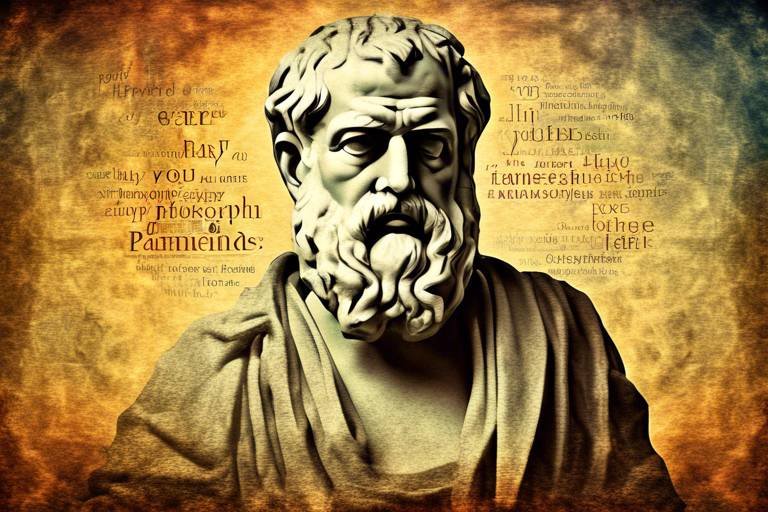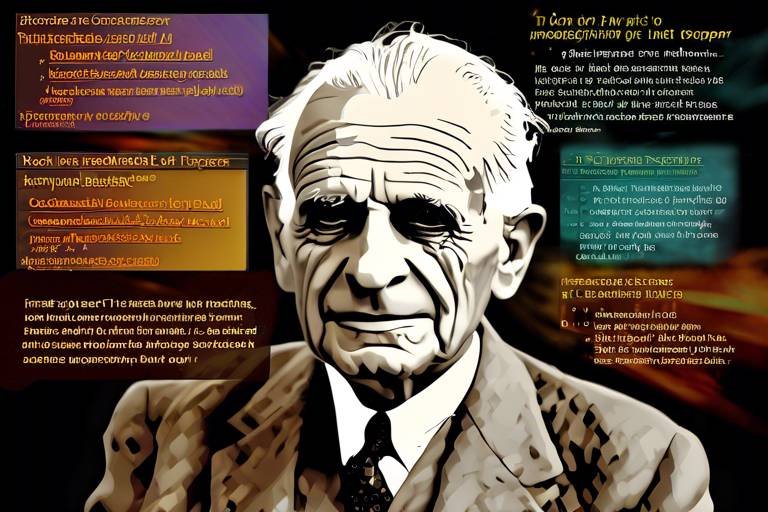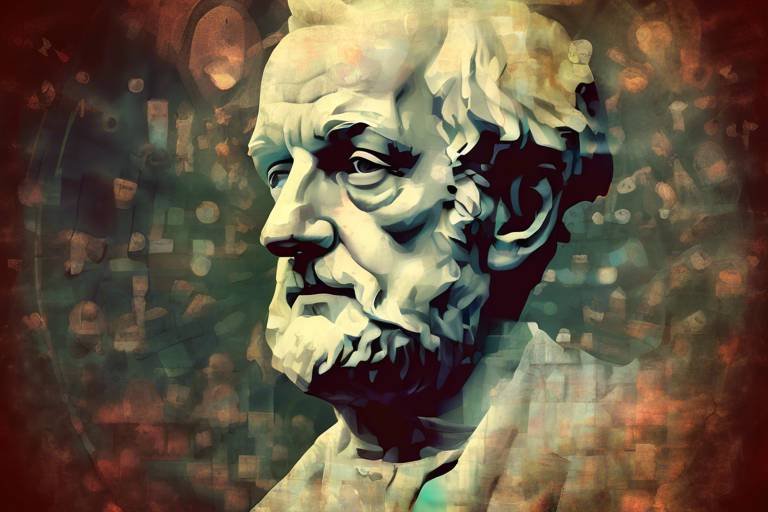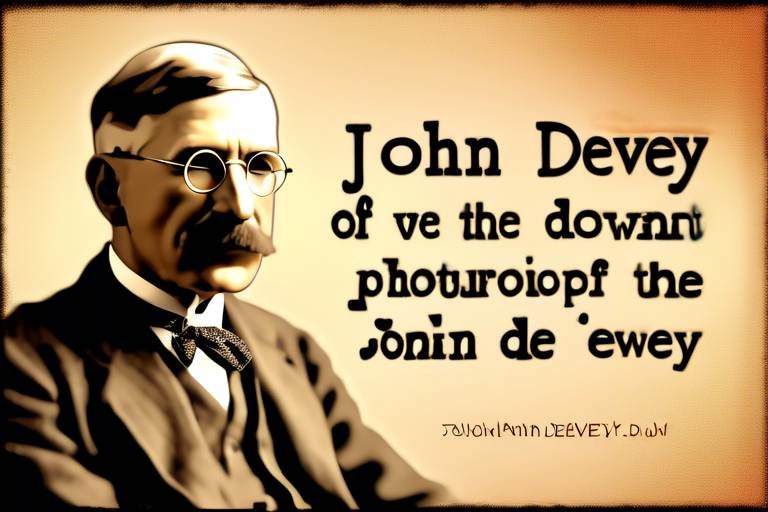Democritus and The Philosophy of Atomism
Democritus, a name often overshadowed by other great philosophers, was a trailblazer in the realm of science and philosophy. Born in ancient Greece around 460 BCE, he introduced the revolutionary concept of atomism, which posited that everything in the universe is composed of small, indivisible particles called atoms. This idea was not just a scientific hypothesis; it was a profound challenge to the prevailing notions of reality and existence. Imagine a world where everything you see, touch, and feel is made up of tiny, invisible building blocks—this was the essence of Democritus's thought.
His philosophy was groundbreaking, as it suggested that these atoms were eternal, unchangeable, and varied in shape and size. This idea was a radical departure from the more mystical explanations of the universe that were common during his time. Instead of attributing the nature of reality to the whims of the gods or supernatural forces, Democritus proposed a materialistic view of the world. He believed that understanding the nature of these atoms would unlock the secrets of the universe, paving the way for a more scientific approach to inquiry.
Democritus's ideas were not just theoretical; they had practical implications that would influence countless fields, from chemistry to physics. His assertion that atoms could combine in various ways to form different substances laid the groundwork for modern atomic theory. In a sense, he was one of the first to think of the universe in terms of particles and forces, a concept that resonates even today in the study of quantum mechanics.
Moreover, Democritus's philosophical inquiries extended beyond the physical realm. He pondered questions about determinism and free will, suggesting that while atoms behave according to natural laws, the complexity of their interactions gives rise to the phenomena we observe. This interplay between the deterministic nature of atoms and the chaotic nature of life raises questions that philosophers continue to grapple with. It's as if Democritus threw a stone into the pond of philosophical thought, creating ripples that extend far beyond his time.
In summary, Democritus's contributions to the philosophy of atomism are nothing short of revolutionary. He not only laid the foundation for modern science but also challenged humanity's understanding of existence itself. His ideas invite us to explore the very fabric of reality, urging us to look beyond the surface and consider the invisible forces that shape our world. As we delve deeper into the implications of his theories, we find ourselves not just in the realm of science, but also in a rich tapestry of philosophical inquiry that continues to inspire and provoke thought today.
- What is atomism? Atomism is the philosophical theory that posits that everything in the universe is made up of small, indivisible particles called atoms.
- Who was Democritus? Democritus was an ancient Greek philosopher known for his contributions to the development of atomism.
- How did Democritus influence modern science? His ideas laid the groundwork for modern atomic theory, influencing fields such as chemistry and physics.
- What are the philosophical implications of Democritus's work? His work raises questions about determinism, free will, and the nature of reality that continue to be debated by philosophers today.

Historical Context of Atomism
The concept of atomism did not emerge in a vacuum; rather, it was the result of a rich tapestry of philosophical inquiry and scientific exploration in ancient Greece. To truly appreciate the revolutionary ideas of Democritus, it's essential to understand the historical backdrop against which he developed his theories. In a time when the world was largely explained through mythology and the whims of the gods, thinkers began to seek more rational explanations for the nature of reality. This shift marked the beginning of a new era in philosophical thought.
Before Democritus, the pre-Socratic philosophers laid the groundwork for atomism by questioning the fundamental nature of existence. Thinkers like Heraclitus and Parmenides explored ideas of change and permanence, respectively. While Heraclitus believed everything was in a constant state of flux, Parmenides argued that change was an illusion. These contrasting views created a fertile ground for Democritus to propose a radically different perspective: that everything is composed of tiny, indivisible particles called atoms.
Moreover, the intellectual climate of ancient Greece was ripe for scientific inquiry. The rise of early mathematics, particularly through figures like Pythagoras, introduced concepts that would influence Democritus's thinking. The notion of numbers and their relationships provided a framework for understanding the universe in a more systematic way. For instance, just as numbers can be combined and manipulated, Democritus posited that atoms could interact in various ways to form all matter.
During this period, the exploration of the natural world was not merely an academic pursuit; it was a quest for understanding that permeated the culture. Philosophers began to engage in discussions about the nature of reality, existence, and the cosmos. This was a time when the boundaries between science and philosophy were blurred, and the search for knowledge was seen as a noble endeavor. Democritus, with his radical ideas about atomism, stood at the forefront of this intellectual revolution.
To summarize, the historical context of atomism is characterized by:
- The influence of pre-Socratic philosophers who questioned the nature of existence.
- The rise of early mathematical concepts that shaped logical reasoning.
- A cultural environment that encouraged philosophical inquiry and scientific exploration.
Democritus’s theories were not just a reflection of his personal insights; they were a culmination of centuries of thought that sought to explain the universe in a rational, systematic manner. His ideas about indivisible particles offered a new lens through which to view reality, challenging the prevailing notions of his time and paving the way for future scientific advancements.
In conclusion, understanding the historical context of atomism is crucial for grasping the significance of Democritus's contributions. His ideas emerged from a rich philosophical tradition and a burgeoning interest in the natural world, setting the stage for a profound shift in how humanity perceives matter and existence.

Democritus: Life and Background
Democritus, often hailed as the "Laughing Philosopher," was born around 460 BCE in Abdera, a small city in Thrace, Greece. His life was a tapestry woven with threads of curiosity, exploration, and intellectual fervor. Growing up in a period where thinkers like Socrates and Plato were laying the foundations of Western philosophy, Democritus was destined to carve his own niche in the realm of ideas. His upbringing in a wealthy family afforded him the opportunity to travel extensively, which significantly shaped his philosophical outlook.
During his travels, Democritus ventured into Egypt and Persia, absorbing diverse cultures and philosophies. This exposure to different schools of thought enriched his understanding of the universe and the nature of existence. He was particularly fascinated by the concept of the cosmos and how everything is interconnected. It was during these formative years that he began to ponder the fundamental nature of matter, leading him to develop his groundbreaking atomic theory.
Education played a crucial role in Democritus's life. He studied under various philosophers, including Leucippus, who is often credited as the co-founder of atomism. Together, they explored the idea that everything in the universe is composed of tiny, indivisible particles called atoms. This idea was revolutionary for its time, challenging the prevailing notions of matter and reality. Democritus's thirst for knowledge and understanding drove him to question the world around him, prompting him to ask profound questions about existence, change, and the nature of the cosmos.
Despite his significant contributions to philosophy and science, Democritus's ideas were not widely accepted during his lifetime. Many of his contemporaries dismissed his theories, favoring instead the more popular philosophies of the day. However, this did not deter him. He continued to write extensively, producing over 70 works on various subjects, including ethics, physics, and mathematics. His most notable work, "On Nature," delved into the principles of atomism and laid the groundwork for future scientific inquiry.
Interestingly, Democritus's life was marked by a profound sense of humor and a belief in the importance of joy. He famously stated, "Happiness resides not in possessions, and not in gold, happiness dwells in the soul." This perspective reflects his understanding that the pursuit of knowledge and wisdom is intrinsically linked to a fulfilling life. His laughter and lightheartedness stand in stark contrast to the often serious demeanor of other philosophers, making him a unique figure in the annals of philosophy.
In conclusion, Democritus's life and background were instrumental in shaping his atomic theory. His travels, education, and personal philosophy contributed to his revolutionary ideas about the nature of reality. Although his views were not fully appreciated in his time, the seeds he planted have grown into a rich legacy that continues to influence both science and philosophy today.
- What is atomism? Atomism is the philosophical theory that all matter is composed of indivisible particles called atoms.
- Who were Democritus's influences? Democritus was influenced by earlier pre-Socratic philosophers, particularly Leucippus, as well as mathematical concepts of his time.
- What impact did Democritus have on modern science? His ideas about atoms laid the groundwork for modern chemistry and physics, influencing contemporary theories such as quantum mechanics.
- Why is Democritus referred to as the "Laughing Philosopher"? He is called the "Laughing Philosopher" due to his belief in the importance of joy and happiness in life, which he often expressed through humor.

Influences on Democritus
Democritus, often hailed as the "laughing philosopher," was not only a thinker in isolation but rather a product of a rich intellectual tapestry woven by his predecessors. His philosophical ideas were profoundly influenced by several key figures and schools of thought, which shaped his understanding of the universe and the nature of reality. Among these influences, the Pre-Socratic philosophers played a pivotal role. Thinkers like Heraclitus and Parmenides challenged the conventional wisdom of their time, raising questions about change, permanence, and the essence of being. Their explorations pushed Democritus to consider the fundamental nature of matter and existence.
Another significant influence on Democritus was the realm of mathematics. The abstract thinking required in mathematics helped him conceptualize his ideas about atoms as the indivisible building blocks of matter. He drew upon geometric principles to argue that if matter could be divided endlessly, there would be no ultimate substance. This mathematical lens allowed him to envision a world composed of tiny, unobservable particles, which he termed "atomos," meaning uncuttable. This concept was revolutionary; it was as if he had discovered the hidden architecture of the universe, laying the groundwork for what would eventually blossom into modern atomic theory.
Moreover, Democritus was influenced by the cultural and scientific climate of ancient Greece. The bustling exchanges of ideas in cities like Abdera, where he was born, and Athens, where many philosophers gathered, provided fertile ground for his thoughts. The dialogues among thinkers, the debates over metaphysics, and the inquiries into natural phenomena all contributed to shaping his worldview. He was like a sponge, absorbing the ideas around him and distilling them into his unique understanding of the cosmos.
In summary, the influences on Democritus were multifaceted, encompassing philosophical, mathematical, and cultural dimensions. His ability to synthesize these diverse strands of thought is what set him apart as a pioneer of atomism. Without these influences, the landscape of philosophy and science might look vastly different today, as Democritus's ideas continue to echo through the ages, challenging us to reconsider the nature of reality itself.

Pre-Socratic Philosophers
Before Democritus stepped onto the philosophical stage, a remarkable group of thinkers known as the laid the groundwork for many of his ideas. These early philosophers, who lived in ancient Greece before Socrates, were primarily concerned with the nature of the universe and the fundamental substances that constitute reality. They posed questions that ventured beyond mythology, seeking rational explanations for the world around them.
One of the most influential figures was Thales of Miletus, who is often credited as the first philosopher in Western history. Thales proposed that water was the essential substance of all things. This idea of a singular underlying principle would resonate with Democritus, who later posited that everything is composed of indivisible particles, or atoms.
Another significant thinker, Anaximander, introduced the concept of the apeiron, or the boundless, as the origin of all things. This abstract notion suggested that there might be something beyond the tangible elements, which aligns with Democritus's idea of atoms being the building blocks of matter, invisible yet fundamental.
Heraclitus also made a mark with his famous assertion that "everything flows," emphasizing the constant state of change in the universe. This notion of flux contrasts with Democritus's more static view of atoms, yet it highlights the dynamic nature of existence that both philosophers grappled with in their own ways.
Furthermore, Parmenides took a radically different approach by arguing that change is an illusion and that reality is unchanging and singular. His ideas posed a challenge to Democritus's atomic theory, pushing the latter to refine his thoughts on the nature of existence and the properties of atoms.
These Pre-Socratic philosophers, with their diverse perspectives, created a rich tapestry of ideas that influenced Democritus. Their inquiries into the essence of matter and existence prompted him to explore the concept of indivisible particles, ultimately leading to his formulation of atomism. The interplay of their thoughts laid a philosophical foundation that would resonate through the ages, shaping not only Democritus's theories but also the future of scientific inquiry.
In summary, the Pre-Socratic philosophers were more than just predecessors; they were the intellectual catalysts that ignited the flame of inquiry in Democritus. Their explorations into the nature of reality provided the fertile soil from which his revolutionary ideas about atoms would grow, reminding us that every great thinker stands on the shoulders of giants.
- Who were the Pre-Socratic philosophers?
The Pre-Socratic philosophers were early Greek thinkers who explored the nature of reality and existence before the time of Socrates. Key figures include Thales, Anaximander, Heraclitus, and Parmenides. - What was the main contribution of Democritus?
Democritus is best known for his theory of atomism, which posits that everything is made up of indivisible particles called atoms. - How did Pre-Socratic philosophers influence Democritus?
The Pre-Socratic philosophers explored fundamental questions about matter and existence, laying the groundwork for Democritus's ideas on atoms and the nature of reality.

Mathematical Ideas
Democritus's philosophical exploration of atomism was deeply intertwined with his understanding of mathematics. In ancient Greece, mathematics was not just a tool for calculations; it was a way to comprehend the universe. Democritus recognized that the principles of mathematics could help articulate his theories about the indivisible particles, or atoms, that he believed made up all matter. By employing mathematical ideas, he was able to provide a framework that supported his revolutionary concepts of reality.
One of the significant mathematical influences on Democritus was the concept of infinity. He theorized that if matter could be divided endlessly, then there must be a point at which it could no longer be divided—this point being the atom. This notion resonates with mathematical principles where certain quantities can approach infinity but never actually reach it. His thoughts on the indivisibility of atoms can be likened to the way mathematicians approach limits in calculus.
Furthermore, Democritus's ideas regarding the arrangement of atoms were reminiscent of geometric principles. He posited that the shape and arrangement of atoms determined the properties of matter. For example, he argued that smooth atoms would create smooth surfaces, while jagged atoms would lead to rough textures. This analogy can be illustrated with a simple table comparing the shapes of atoms and their corresponding material properties:
| Atom Shape | Material Property |
|---|---|
| Spherical | Fluidity |
| Angular | Rigidity |
| Jagged | Roughness |
This mathematical approach to understanding the physical world allowed Democritus to formulate his atomic theory in a way that was not merely speculative but grounded in logical reasoning. He believed that just as numbers could combine to create complex equations, atoms could combine in various ways to form the diverse materials we observe in nature. This perspective was revolutionary, as it paved the way for future philosophers and scientists to merge mathematical concepts with physical theories.
In summary, the influence of mathematical ideas on Democritus's thought process cannot be overstated. His ability to interlink mathematics with his atomic theory provided a solid foundation that would inspire generations of thinkers. By viewing the universe through a mathematical lens, Democritus not only challenged existing beliefs but also opened up new avenues for inquiry that continue to resonate in modern science.
- What is atomism? Atomism is the philosophical theory that all matter is composed of small, indivisible particles called atoms.
- Who was Democritus? Democritus was an ancient Greek philosopher who is best known for his contributions to the development of atomic theory.
- How did mathematics influence Democritus's theories? Democritus used mathematical concepts to explain the nature of atoms and their arrangements, which helped him articulate his ideas about matter.
- What is the legacy of Democritus? His ideas laid the groundwork for modern science, particularly in chemistry and physics, influencing how we understand the structure of matter.

Core Principles of Atomism
The philosophy of atomism, as proposed by Democritus, is a groundbreaking framework that fundamentally reshaped our understanding of matter and reality. At its core, atomism posits that everything in the universe is composed of tiny, indivisible particles called atoms. These atoms are not just the building blocks of matter; they are the essence of existence itself. Imagine the universe as a vast tapestry, where each thread is an atom weaving together to create the intricate patterns of life, matter, and energy.
One of the key principles of atomism is the idea of indivisibility. Democritus argued that atoms cannot be divided into smaller parts; they are the smallest units of matter. This notion was revolutionary at the time, challenging the prevailing belief that matter could be infinitely divided. To visualize this, think of an atom as a single grain of sand on a beach. No matter how much you try to break it down, that grain remains a grain, just as an atom remains an atom.
Another core principle is the concept of infinite variety. According to Democritus, while atoms are uniform in nature, they can combine in countless ways to form different substances. Just like how a few notes in music can create an infinite number of melodies, the different arrangements and combinations of atoms lead to the vast diversity of materials we see around us. This principle laid the foundation for our understanding of chemical reactions and the formation of compounds.
Democritus also emphasized the importance of motion. He believed that atoms are in constant motion, colliding and interacting with one another. This idea of dynamic interaction is crucial, as it explains how matter changes and transforms. Imagine a bustling city where people (atoms) are constantly moving, interacting, and reshaping the environment (matter) around them. This principle of motion is echoed in modern physics, where the behavior of particles is a central focus of study.
Moreover, atomism introduces the concept of void, or empty space, as a necessary counterpart to atoms. Democritus argued that for atoms to exist and move, there must be empty space for them to occupy. This idea challenges the notion of a completely filled universe, suggesting that emptiness is just as vital as substance. Picture a balloon: the air inside represents the atoms, while the space around it represents the void. Without that empty space, the balloon would not exist.
In summary, the core principles of atomism—indivisibility, infinite variety, motion, and the existence of void—form a comprehensive framework that not only explains the nature of matter but also sets the stage for future scientific inquiry. These ideas have not only survived the test of time but have also paved the way for modern scientific explorations, influencing fields such as chemistry and physics profoundly.
- What is atomism? Atomism is the philosophical theory that all matter is composed of small, indivisible particles called atoms.
- Who was Democritus? Democritus was an ancient Greek philosopher who is best known for his contributions to the development of atomism.
- How did Democritus influence modern science? His ideas about atoms laid the groundwork for modern chemistry and physics, influencing how we understand matter and its interactions.
- What are the core principles of atomism? The core principles include indivisibility, infinite variety, motion, and the existence of void.

Impact on Modern Science
Democritus's ideas about atoms have profoundly influenced modern scientific thought, paving the way for advancements in chemistry and physics. Imagine a world where everything is made up of tiny, indivisible particles—this was the revolutionary idea put forth by Democritus over two millennia ago. His notion that matter is composed of small, indestructible units called "atoms" was not just a philosophical musing; it laid the groundwork for what we now understand about the physical universe.
Fast forward to today, and we see how Democritus's insights have permeated various scientific disciplines. For example, in chemistry, the atomic theory serves as a fundamental principle explaining the behavior of matter. The periodic table, a cornerstone of chemical education, is a direct descendant of Democritus's ideas. Each element can be viewed as a collection of atoms, each with its unique properties, interacting in ways that govern the reactions we observe in nature.
Furthermore, the connection between Democritus's atomic theory and modern physics is undeniable. His concept of atoms as the smallest units of matter resonates with contemporary ideas in quantum mechanics, where particles behave in ways that challenge our everyday understanding of reality. Quantum theory suggests that at the subatomic level, particles can exist in multiple states simultaneously, a concept that echoes Democritus's vision of an unpredictable and dynamic universe.
To illustrate the impact of Democritus's ideas on modern science, consider the following table that highlights key advancements influenced by atomic theory:
| Field | Key Concept | Influence of Democritus |
|---|---|---|
| Chemistry | Atomic Structure | Foundation for understanding chemical reactions and bonding. |
| Physics | Quantum Mechanics | Concept of particles behaving unpredictably at the atomic level. |
| Philosophy | Materialism | Encouraged a focus on physical substances as the basis of reality. |
Democritus's work also raises significant philosophical questions about the nature of reality and existence. For instance, if everything is made up of atoms, what does that say about free will and determinism? These questions continue to inspire debates among philosophers today, demonstrating that Democritus's influence extends beyond the realm of science into the very fabric of human thought.
In conclusion, the impact of Democritus on modern science is monumental. His ideas about atoms not only challenged the prevailing notions of his time but also provided a framework for understanding the universe that remains relevant today. As we delve deeper into the mysteries of matter and energy, we find ourselves standing on the shoulders of this ancient thinker, whose legacy continues to shape our understanding of the world around us.
- What is atomism? Atomism is the philosophical belief that everything in the universe is made up of small, indivisible particles called atoms.
- How did Democritus influence modern science? Democritus's ideas laid the groundwork for atomic theory, which is fundamental to chemistry and physics today.
- Are Democritus's ideas still relevant? Yes, his concepts resonate in modern discussions about quantum mechanics and the nature of reality.
- What philosophical questions arise from atomism? Atomism raises questions about determinism, free will, and the nature of existence.

Connection to Quantum Theory
When we dive into the fascinating world of quantum theory, it’s almost like stepping into a realm where the rules of reality twist and turn in ways that would make even the most seasoned physicist scratch their head. Yet, what’s intriguing is that the seeds of these complex ideas can be traced back to none other than Democritus. His early musings about atoms as the fundamental building blocks of matter resonate eerily with the principles of quantum mechanics that we understand today.
To grasp this connection, let’s first consider what Democritus proposed. He believed that everything in the universe is composed of tiny, indivisible particles called atoms, which move through the void. This concept, while simplistic compared to modern understanding, laid the groundwork for a framework that would eventually evolve into our current atomic theory. Fast forward to the 20th century, and we find quantum mechanics challenging our perceptions of these very atoms. Instead of being solid and indivisible, atoms are now understood to be made up of even smaller particles, exhibiting behaviors that can seem downright bizarre.
One of the most striking parallels between Democritus's ideas and quantum theory is the notion of indeterminacy. In the quantum realm, particles do not have definite positions or velocities until they are measured. This idea echoes Democritus's belief that the nature of reality is not fixed but rather shaped by the interactions of atoms. Just as Democritus envisioned a universe full of moving particles, quantum mechanics reveals a world where particles exist in a state of probability until observed. This raises profound questions about the nature of reality itself: Are we merely observers in a universe governed by randomness?
Moreover, Democritus's atoms were not just static entities; they were dynamic and interacted with one another, influencing the material world. Similarly, in quantum mechanics, particles are in constant flux, engaging in a dance of interactions that can result in phenomena such as entanglement, where particles become interconnected in ways that transcend classical physics. The idea that everything is interconnected at a fundamental level resonates with Democritus's vision of an atomistic universe.
To illustrate this connection further, consider the following table that highlights key similarities between Democritus's atomic theory and modern quantum mechanics:
| Aspect | Democritus's Atomic Theory | Quantum Mechanics |
|---|---|---|
| Nature of Matter | Composed of indivisible atoms | Composed of particles that can be both waves and particles |
| Behavior of Particles | Atoms are in constant motion | Particles exist in a state of probability until measured |
| Interconnectedness | Atoms interact and influence each other | Particles can be entangled, affecting each other instantaneously |
| Reality | Dynamic and shaped by atomic interactions | Non-deterministic and influenced by observation |
As we explore these connections, it becomes clear that Democritus's legacy is not just a historical footnote but a precursor to modern scientific thought. His ideas challenge us to reconsider our understanding of the universe, urging us to embrace the complexity and mystery of existence. In a way, Democritus was the original quantum thinker, laying the foundation for a scientific revolution that would not fully bloom until centuries later.
- What is atomism? Atomism is a philosophical theory that suggests that everything in the universe is made up of small, indivisible particles called atoms.
- How did Democritus influence modern science? Democritus's ideas about atoms laid the groundwork for future scientific explorations into the nature of matter, influencing fields such as chemistry and physics.
- What is the significance of quantum mechanics? Quantum mechanics is a fundamental theory in physics that describes the behavior of matter and energy at the smallest scales, revealing the complex and probabilistic nature of particles.
- Are Democritus's ideas still relevant today? Yes, many of Democritus's concepts resonate with modern scientific theories, particularly in understanding the nature of reality and matter.

Philosophical Implications
Democritus's work on atomism does more than just explain the physical world; it invites us to ponder profound philosophical questions that have echoed through the ages. One of the most significant implications of his theory is the challenge it presents to the concept of determinism. If everything is composed of tiny, indivisible particles moving in a void, does that mean our lives are predetermined by the interactions of these atoms? Or is there room for free will in a world governed by atomic interactions? This debate is as relevant today as it was in ancient Greece, sparking discussions among philosophers, scientists, and thinkers.
Moreover, the notion of atoms being the fundamental building blocks of reality prompts us to question the very nature of existence. If all matter is reducible to atoms, can we truly understand the essence of things? Are the qualities we perceive—like color, taste, and even emotions—merely the result of atomic arrangements? This leads us to consider the subjective nature of reality, an idea that has profound implications for both philosophy and science. In fact, Democritus’s assertion that "nothing exists except atoms and the void" challenges us to rethink our understanding of the universe.
Furthermore, Democritus's ideas foreshadowed the later philosophical inquiries into the nature of knowledge and perception. His assertion that our senses can deceive us raises the question: how can we trust our perceptions if they are merely interpretations of atomic interactions? This skepticism about sensory experience laid the groundwork for later philosophers, such as René Descartes, who famously questioned the certainty of existence with his statement, "I think, therefore I am."
To illustrate the impact of Democritus's ideas on modern thought, consider the following table that highlights some of the key philosophical questions raised by his atomic theory:
| Philosophical Question | Implication |
|---|---|
| Is the universe deterministic? | Challenges the notion of free will and personal agency. |
| What is the nature of reality? | Encourages exploration into the essence of existence beyond physical matter. |
| Can we trust our senses? | Raises skepticism about the reliability of sensory perception. |
| What constitutes knowledge? | Provokes inquiry into the sources and limits of human understanding. |
In conclusion, the philosophical implications of Democritus's atomism extend far beyond the realm of science. His ideas invite us to engage in a deeper exploration of existence, reality, and knowledge. They challenge us to consider the intricate relationships between the physical and metaphysical, and how these relationships shape our understanding of the universe. As we continue to grapple with these questions today, the legacy of Democritus remains a cornerstone of both philosophical and scientific discourse.
- What is atomism? Atomism is a philosophical theory that posits that everything in the universe is composed of small, indivisible particles called atoms.
- How did Democritus influence modern science? His ideas laid the groundwork for modern atomic theory, influencing fields like chemistry and physics.
- What are the main philosophical questions raised by atomism? Key questions include the nature of reality, determinism vs. free will, and the reliability of human perception.
- Are Democritus's ideas still relevant today? Yes, his thoughts continue to inspire debates in both philosophy and science, particularly in discussions about the nature of existence and knowledge.

Legacy of Democritus
Democritus, often hailed as the "father of atomism," has left a legacy that resonates through both philosophy and science. His revolutionary ideas about the nature of matter and existence have paved the way for centuries of inquiry and discovery. While his contemporaries were preoccupied with metaphysical speculations, Democritus took a bold step into the realm of the empirical, suggesting that everything in the universe is composed of tiny, indivisible particles he called "atoms." This notion was not just a radical departure from the prevailing thought of his time but also a foundation upon which modern science would eventually stand.
One of the most significant aspects of Democritus's legacy is how it laid the groundwork for later scientific advancements. His ideas were not merely philosophical musings; they sparked a revolution in how we understand the material world. For instance, in the table below, we can see how Democritus's concepts have influenced various fields:
| Field | Influence of Democritus |
|---|---|
| Chemistry | His atomic theory paved the way for the development of the modern periodic table and atomic models. |
| Physics | His ideas foreshadowed the principles of quantum mechanics and particle physics. |
| Philosophy | His thoughts on determinism and the nature of reality continue to influence philosophical debates. |
Moreover, Democritus's impact extends beyond just scientific disciplines. His approach to understanding the universe through observation and reason has inspired countless thinkers throughout history. The Scientific Revolution of the 17th century, for example, can trace some of its roots back to Democritus's insistence on a materialistic view of the world. Thinkers like Galileo and Newton built upon the principles of atomism, leading to breakthroughs that changed our understanding of physics and the cosmos.
In the realm of philosophy, Democritus's ideas challenge us to consider profound questions about existence. His belief that everything is composed of atoms leads to discussions about determinism and free will. If all events are the result of atomic interactions, what does that mean for human agency? These questions have fueled debates among philosophers for centuries and continue to do so today. In essence, Democritus's legacy invites us to explore the intricate dance between science and philosophy.
Ultimately, the legacy of Democritus is not just a footnote in the annals of history; it is a living testament to the power of ideas. His vision of a universe made up of atoms has not only stood the test of time but has also been validated by modern scientific discoveries. As we continue to unravel the mysteries of the universe, Democritus's contributions remind us that the quest for knowledge is an ongoing journey, one that began with a simple yet profound idea: that everything is made of atoms.
- Who was Democritus? Democritus was an ancient Greek philosopher known for his formulation of the atomic theory of the universe.
- What is atomism? Atomism is the belief that everything in the universe is made up of small, indivisible particles called atoms.
- How did Democritus influence modern science? His ideas laid the groundwork for modern chemistry and physics, influencing concepts like the atomic model and quantum mechanics.
- What philosophical questions did Democritus raise? He raised questions about the nature of reality, determinism, and free will, which continue to be debated today.
Frequently Asked Questions
- What is atomism according to Democritus?
Atomism, as proposed by Democritus, is the philosophical theory that everything in the universe is composed of small, indivisible particles called atoms. He believed that these atoms are in constant motion and combine in various ways to form all matter, challenging the idea that matter is continuous.
- How did Democritus influence modern science?
Democritus laid the groundwork for modern atomic theory, which has become fundamental in chemistry and physics. His ideas about atoms being the basic building blocks of matter paved the way for later scientists, including John Dalton and Albert Einstein, to develop more advanced theories about atomic structure and behavior.
- What were the main influences on Democritus's thinking?
Democritus was influenced by earlier pre-Socratic philosophers, who explored the nature of reality. Additionally, mathematical concepts played a crucial role in shaping his understanding of atoms, as they helped him conceptualize the indivisible nature of these particles.
- What are the core principles of Democritus's atomism?
The core principles of Democritus's atomism include the idea that atoms are indivisible, eternal, and vary in shape and size. He proposed that the properties of matter depend on the arrangement and movement of these atoms, which fundamentally changed how we understand the composition of the universe.
- How does Democritus's theory relate to quantum mechanics?
Democritus's atomic theory has intriguing parallels with modern quantum mechanics, particularly in the idea that particles are not only the building blocks of matter but also exhibit wave-particle duality. His early insights into the nature of atoms resonate with concepts in contemporary physics, showing the timelessness of his ideas.
- What philosophical implications arise from Democritus's work?
Democritus's theories raise significant questions about determinism, free will, and the essence of reality. His assertion that everything is made up of atoms suggests a mechanistic view of the universe, prompting ongoing debates among philosophers regarding the nature of existence and human agency.
- What is the legacy of Democritus today?
The legacy of Democritus is profound, as his contributions to atomism have influenced both philosophy and science. His ideas continue to inspire research in various fields, demonstrating the lasting impact of his thoughts on the nature of matter and the universe.



















